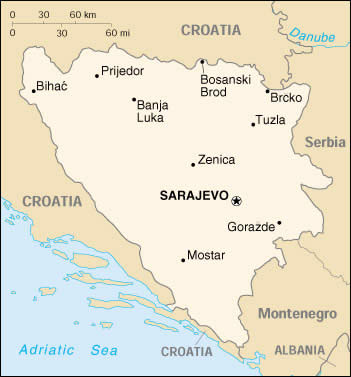 Bosnia-Herzegovina
Bosnia-Herzegovina
History
The earliest people to live in the nation known today as Bosnia-Herzegovina were the Illyrians. Roman legions conquered the Illyrians early in the establishment of the Roman Empire. After the fall of Rome, the Ottoman and Austro-Hungarian empires controlled the land for centuries.
Early in the 20th century, Bosnia-Herzegovina was a constituent republic of Yugoslavia. During World War II, it was occupied by Nazi Germany. After the war, as a part of Communist Yugoslavia, its people were hindered from advancing technologically and economically as did Western Europe. When Communism fell in Europe, ethnic disputes broke out in Bosnia-Herzegovina. Muslim, Croat and Serb factions fought each other from 1992 to 1995. After the civil war which depleted the population dramatically, the nation of Bosnia-Herzegovina was divided three ways, with Serbs controlling about half the country. Since 1995, the United Nations and NATO have maintained a presence in the country, attempting to bring stability and economic recovery.
Church History
Very few believers existed in Bosnia-Herzegovina before the civil war of the ‘90s. From 1948 until the war began in 1992, there were 3 Pentecostal churches established, but when war broke out, all the leadership left the country.
The Movement Today
In 1991, Peter Kuzmic from Croatia established the Agape relief agency. A branch in Bosnia-Herzegovina was led by a man from the church in Mostar beginning in 1992. During and after the war, Agape distributed food to tens of thousands of war victims, and established hot kitchens.
In 1993, Nikola Skrinjaric from Croatia moved to Mostar, ministering aid and planting a church in West Mostar. At the end of 1994, he started meetings also in East Mostar and began reconstruction of the destroyed church building there. The building now houses the East Mostar congregation and the Bible school, started in 1996, which trains national workers. Children’s summer camps started in 1993 to bring relief from war to the victims of the fighting.
Newly developed church leaders visited many of the other cities, meeting with isolated believers, thus founding several of the churches presently active in the country. Other faithful believers and workers have been used of God to build up congregations as well.
The Assemblies of God works closely with the Evangelical Church of Bosnia-Herzegovina and will be sending its first resident missionary family there in 2004. The church reports the following statistics: 55 ministers and workers, 22 churches and preaching points, 723 members and adherents, and one Bible school with 10 students.
Additional Facts About Bosnia
- Capital: Sarajevo
- Area: 19,741 square miles
- Population: 3.9 million – Bosniak 46%, Serb 38%, Croat 15%, Other 1%
- (note: Bosniak has replaced Muslim as an ethnic term in part to avoid confusion with the religious term)
- Languages: Bosnian, Croatian, and Serbian
- Government: Republic
- Agriculture: Corn, wheat, fruits and vegetables
- Industry: Steel, mining, textiles and timber




